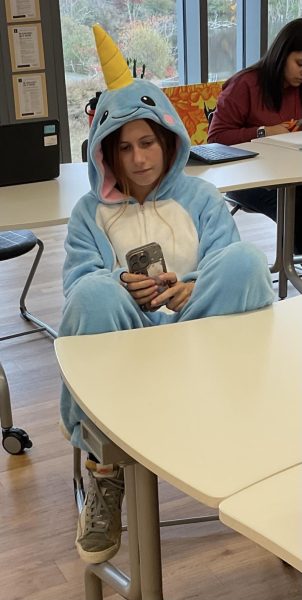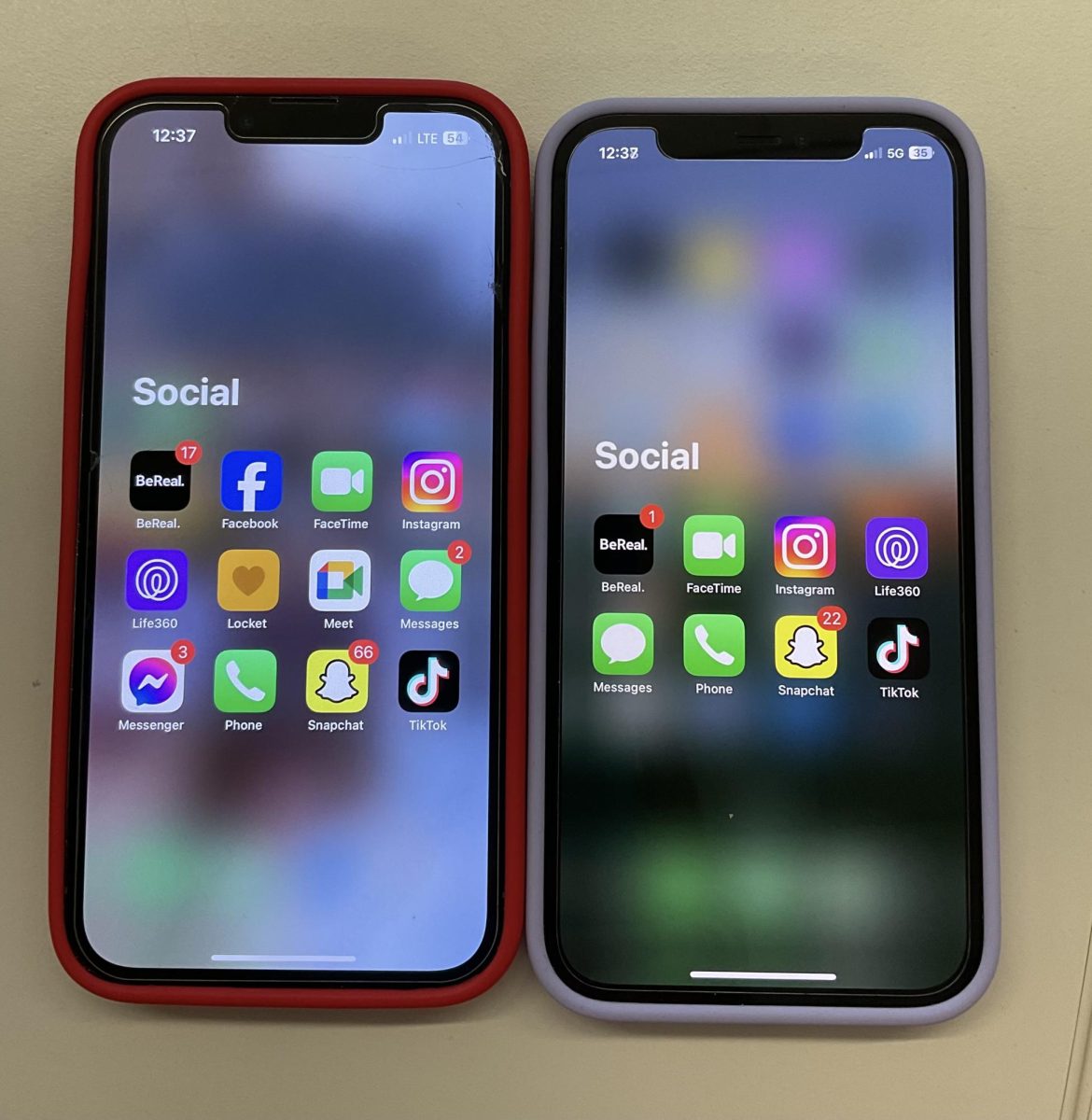Research shows that social media negatively affects the teen mind. Whether it’s in the morning, after school, or on the weekends, teens spend many hours in a row on their devices looking at texts from friends, social media, or checking notifications. According to Jonathan Rothwell in “Hours on Social Media Per Day,” the average teenager spends up to 4.8 hours a day or more on social media, while the average grown up spends up to 2.5 a day or more. Freshmen Molly O’Donnell and Megan Campion claim they spend between 3-4 hours on their phones. The most commonly used social media platform is Facebook, with over 3 billion people viewing it monthly. Despite the number of people who view it, the average person spends only about 35 minutes on Facebook a day. The most commonly used platform for teens in general is YouTube, with over 77% of teens viewing it daily.
Freshman Molly O’Donnell thinks that the negatives of social media outweigh the positives. She said that many cons come with the use of social media, such as issues with body image: “It can cause people to feel insecure about themselves and jealous of how others look.” Freshman Megan Campion agrees with this statement. She claims that social media is all anyone focuses on and can cause people to feel addicted. If given the choice to get rid of social media permanently, Molly and Megan say they would. They said without social media they would take the chance to go outside and socialize with their friends in person.
Social media heavily affects the amount of sleep teenagers get at night. According to CDC Healthy Schools, The average teenager requires about 8 – 10 hours of sleep each night, but because of the use of social media, teens are only getting around 7 hours of sleep. Molly said she stays up until at least midnight on her phone each night. This causes many teens to feel tired throughout the day. However, going to sleep late at night and feeling tired throughout the day has become a normal, daily routine for the average teenager. No matter how tired they feel, they’re always on their phones.
Not only do teens lack the amount of sleep they need, they also lack the amount of physical activity needed to be healthy and active, which is an hour or more daily. Besides school sports, teens have trouble getting off their phones and doing something active and productive. Whether it’s going on a walk or spending time outside, they just can’t seem to put their phones down.
Now, of course adults spent their days talking on their telephone, and chatting to their friends, but many grown-ups feel strongly about the use of social media nowadays. On the other hand, adults spend a lot of time texting or on their phones, whether it’s for work or just for fun. Some grown-ups feel that social media has ruined today’s generation. They say they wish that kids nowadays could experience the childhood they had growing up, playing outside and talking to their friends.
Is social media an  addiction? Well, according to Lee Health, the use of social media triggers a chemical in your brain’s reward system, called dopamine or the “feel good chemical.” This chemical is like a chemical messenger involved in neurological and psychological functioning. When we use social media, dopamine is released, causing us to feel better, but to also feel the need to satisfy the feeling, causing us to seem addicted.
addiction? Well, according to Lee Health, the use of social media triggers a chemical in your brain’s reward system, called dopamine or the “feel good chemical.” This chemical is like a chemical messenger involved in neurological and psychological functioning. When we use social media, dopamine is released, causing us to feel better, but to also feel the need to satisfy the feeling, causing us to seem addicted.
How does social media affect your mental health? Many kids nowadays have some sort of expectation for what people should look and act like on social media. If someone doesn’t look a certain way in a picture or a selfie, it causes them to feel insecure and unconfident. Many people go out of their way to get plastic surgery to look how they think society wants them to look. This often leads to people not even looking human anymore, which is called Selfie Dysmorphia. According to CEENTA, selfie dysmorphia is when a person gets fixated on perceived flaws and wishes they looked better. This can lead to very bad and impulsive decisions, just like plastic surgery.
Not only does it affect your social health in the sense of insecurity, but it also can majorly affect people’s social wellness. On social media, there are many cyberbullies and mean people behind their screens, who make rude comments, leaving people to feel bad about themselves. Why would someone do this? People who do this aren’t always looking to hurt someone. They may have something traumatic that’s happening in their lives and want to take the focus away from their own feelings. People also do this when they feel jealous of another’s appearance and want to feel better about themselves. They want to receive the satisfaction of seeing someone they’re jealous of feel hurt.
Social media does affect teens’ minds and their mental health. So, next time you pick up your phone, make sure you’re managing your time wisely and try to get outside every now and then. Get some exercise and spend some time with your friends and family.



Poo • Nov 23, 2023 at 11:25 am
This is very informative and clearly written. What an important topic!